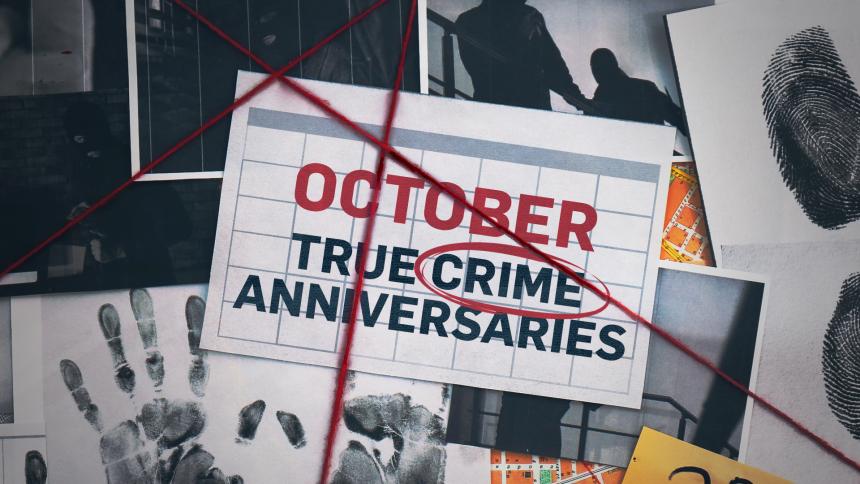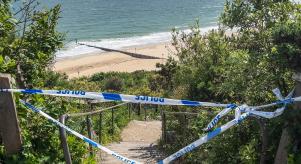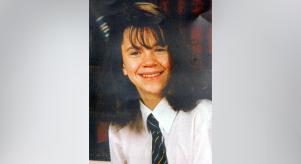
True crime anniversaries in October
Now October is here we’re back exploring some of the most notable crime anniversaries. Below is a summary of some of the most significant major criminal events that took place in October over the last 50 years.
1st October: April Jones’ murder (2012)
Five-year-old April Jones from Powys, Wales, was murdered on 1st October 2012. April’s body was never discovered, which made the trial and conviction of her murderer unusual. She disappeared from near her home and was seen climbing into a vehicle. Due to her young age and the nature of her abduction, the crime attracted a lot of national and international press coverage.
Mark Bridger was found guilty of April’s murder in May 2013. He claimed he had run her over and tried to hide the body. However, his story did not convince the jury, and he was sentenced to life imprisonment with a whole life tariff.
2nd October: Sean Mercer goes on trial for the murder of Rhys Jones (2008)
Rhys Jones was an 11-year-old boy shot while walking home from football practice in Liverpool. His death was a result of local gang activity, and Sean Mercer, aged 16 at the time of the shooting, went on trial on 2nd October 2008.
Gathering evidence for the crime took significantly longer than it should have due to obstructions from other gang members and their families. Parents of the gang members, including Mercer's mother, were later convicted for perverting the course of justice. Mercer was eventually convicted of the murder of Rhys Jones in December 2008 and handed a life sentence.
3rd October: The O.J. Simpson verdict (1995)
Few courtroom moments have gripped the world like the conclusion of the O.J. Simpson murder trial. On 3rd October 1995, after months of testimony and wall-to-wall media coverage, the former American football star was acquitted of murdering his ex-wife, Nicole Brown Simpson and her friend Ron Goldman.
The case, dubbed ‘the trial of the century,’ split public opinion along racial and cultural lines. Simpson walked free, but a later civil trial in 1997 found him liable for wrongful death and awarded $33.5 million in damages to the victims’ families. To this day, the not guilty verdict remains one of the most debated in modern legal history.
6th October: PC Keith Blakelock murdered in the line of duty (1985)
PC Keith Blakelock was a fatal casualty involved in the Broadwater Farm housing estate riots in Tottenham. Rioting began after the mother of a wanted man, Cynthia Jarrett, died of heart failure when police entered her home to carry out a search without a warrant. It took place at a time when there was significant unrest between the police and the Black community, and the riots quickly escalated.
PC Blakelock died in the line of duty and was beaten, kicked and stabbed repeatedly. He was the first officer to be killed during a riot in over 150 years, and his murder remains unsolved.
10th October: The remains of murdered student Joy Morgan discovered (2019)
In October 2019, the remains of Joy Morgan were found, after her murderer had been convicted. Joy was a university student murdered by a fellow member of her church in East London. She was last seen on 26th December 2018, but was not officially reported as missing until 7th February 2019.
Shohfah-El Israel was found guilty of her murder on 5th August 2019, but Joy's body was not discovered until two months later. Israel refused to share the whereabouts of her victim, making the trial even more difficult and upsetting for Joy’s family and friends.
12th October: The Bali bombings (2002)
On the night of 12th October 2002, two bombs ripped through packed nightclubs in the tourist district of Kuta, Bali, killing 202 people. Many of the victims were young holidaymakers from Australia, Britain and across Asia. The attack was quickly linked to Jemaah Islamiyah, an extremist group with ties to al-Qaeda.
Several perpetrators, including Amrozi bin Nurhasyim and Imam Samudra, were arrested, convicted and executed for their roles. The bombings shocked the world, devastated Indonesia’s tourism industry, and served as a grim reminder that international terrorism could strike even in places associated with leisure and escape.
25th October: The kidnapping of Ashleigh Hall (2009)
On 25th October 2009, the UK media was shocked by the case of Ashleigh Hall. Ashleigh was a 17-year-old from County Durham who was kidnapped, raped and murdered by Peter Chapman, a convicted sex offender on the register.
Chapman lured her on Facebook by creating a fake profile, pretending to be a teenage boy. Ashleigh believed she was getting a lift from the boy’s father and got into Chapman’s car. After killing her, Chapman dumped her body in a field in Sedgefield. He was arrested the next day on an unrelated matter, then confessed and led police to the body.
In March 2010, Chapman was sentenced to life imprisonment with a minimum term of 35 years. Chapman’s case sparked public debate about social media safety, the monitoring of offenders and the verification of profiles.
26th October: Stephen Parker murders his wife (2010)
Yorkshire-based Stephen Parker was convicted of murdering his wife, and childhood sweetheart, Jane Parker, at their family home.
The unprecedented attack took place on 26th October 2010 after Jane was planning to leave her husband. the case moved forward to trial in May 2011. During the trial at Hull Crown Court, the jury rejected a partial defence of ‘loss of control’ that Parker attempted to employ. He was sentenced to life imprisonment for stabbing and killing Jane after a jealous rage, with a minimum term of 17 years.
The case was grim partly because it involved domestic violence that escalated to murder in what seemed a situation where friends or family had raised concerns beforehand.
28th October: Jeremy Bamber convicted for the White House Farm Murders (1986)
Jeremy Bamber is recognised as one of the UK’s most notorious and manipulative murderers. In August 1985, Bamber shot and killed his adoptive parents, adoptive sister and her six-year-old sons. Bamber claimed to have nothing to do with the murders and as the gun was found in the hands of his sister’s body, it initially looked as though it could be a murder-suicide.
However, Bamber was soon considered a leading suspect when police realised the significant inheritance that would come his way. The prosecution argued that Bamber shot the family before placing the gun in the hands of his sister. He was convicted and sentenced on 28th October 1986, initially to a minimum of 25 years. In 1994, he was informed he would never be released and has since attempted to appeal this ruling more than once. His case currently remains under review.
29th October: The murder of Jack the Hat brings down the Kray Brothers (1967)
On 29th October 1967, Jack McVitie, commonly known as ‘Jack the Hat’, was murdered in London. With so many gang crimes it’s hard to see why this particular murder stands out. However, the murder of Jack the Hat ultimately led to the downfall of Ronnie and Reggie Kray.
The Kray twins' criminal activities dominated the East End of London and it was following McVitie’s murder that they were finally arrested. Both brothers were found guilty of murder on 4th March 1969, and each sentenced to a minimum of 30 years in prison. Ronnie’s murder conviction was for the killing of George Cornell, a rival gang leader, while Reggie was convicted of the murder of Jack the Hat.
Love true crime? Stay in the know with the Crime+Investigation Newsletter! Get exclusive access to new articles, episodes, clips, competitions, and more – delivered weekly and completely free. Don't miss out – sign up today!








